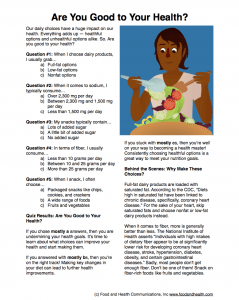Are You Good to Your Health?
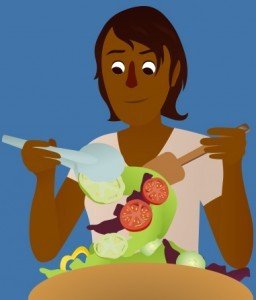 Our daily choices have a huge impact on our health. Everything adds up — healthful options and unhealthful options alike. So. Are you good to your health?Question #1: When I choose dairy products, I usually grab…
Our daily choices have a huge impact on our health. Everything adds up — healthful options and unhealthful options alike. So. Are you good to your health?Question #1: When I choose dairy products, I usually grab…
a) Full-fat optionsb) Low-fat optionsc) Nonfat options
Question #2: When it comes to sodium, I typically consume…
a) Over 2,300 mg per dayb) Between 2,300 mg and 1,500 mg per dayc) Less than 1,500 mg per day
Question #3: My snacks typically contain…
a) Lots of added sugarb) A little bit of added sugarc) No added sugar
Question #4: In terms of fiber, I usually consume…
a) Less than 10 grams per dayb) Between 10 and 25 grams per dayc) More than 25 grams per day
Question #5: When I snack, I often choose…
a) Packaged snacks like chips and crackersb) A wide range of foodsc) Fruits and vegetables
Quiz Results: Are You Good to Your Health? If you chose mostly a answers, then you are undermining your health goals. It’s time to learn about what choices can improve your health and start making them.If you answered with mostly bs, then you’re on the right track! Making key changes in your diet can lead to further health improvements.If you stuck with mostly cs, then you’re well on your way to becoming a health master! Consistently choosing healthful options is a great way to meet your nutrition goals.Behind the Scenes: Why Make These Choices?Let's take a look at the health implications of each choice in this quiz.Full-fat dairy products are loaded with saturated fat. According to the CDC, “Diets high in saturated fat have been linked to chronic disease, specifically, coronary heart disease.” For the sake of your heart, skip saturated fats and choose nonfat or low-fat dairy products instead. For example, choose nonfat milk instead of whole milk in your next latte, or snack on low-fat yogurt instead of full-fat varieties.Let's move on to sodium. The Dietary Guidelines for Americans have revealed that most Americans consume roughly 3,400 mg of sodium each day. This is way more than is healthful, especially considering that roughly half the population should consume no more than 1,500 mg of sodium per day. The guidelines have stated "On average, the higher an individual’s sodium intake, the higher the individual’s blood pressure. A strong body of evidence in adults documents that as sodium intake decreases, so does blood pressure [...]. Keeping blood pressure in the normal range reduces an individual’s risk of cardiovascular disease, congestive heart failure, and kidney disease." So, how can you reduce your sodium consumption? Try cutting down on high-sodium options like frozen foods, breakfast/deli meats, cheese, etc.The next topic on the table is added sugar. We'll begin with some information from MyPlate. "Solid fats and added sugars add calories to the food but few or no nutrients. For this reason, the calories from solid fats and added sugars in a food are often called empty calories." In other words, added sugars add lots of calories to foods, but they generally contain no nutrients or elements that are good for your health. They undermine weight control goals and take up room in your diet that would otherwise go to more nutrient-dense foods. To cut these from your diet and still satisfy your sweet tooth, snack on foods that naturally contain sugar as part of a full package of nutrients. Fresh fruit is a popular go-to treat, and so are dairy products without added sugars (many are plenty sweet on their own).When it comes to fiber, more is generally better than less. The National Institute of Health asserts “Individuals with high intakes of dietary fiber appear to be at significantly lower risk for developing coronary heart disease, stroke, hypertension, diabetes, obesity, and certain gastrointestinal diseases.” Sadly, most people don’t get enough fiber. Don’t be one of them! Snack on fiber-rich foods like fruits and vegetables. This brings us to the last question, which was a little different than the others. Snacking on fruits and vegetables is an approach recommended by MyPlate, the Dietary Guidelines for Americans, and countless studies. It's a good habit to get into because you often end up replacing empty calories with nutrient-dense options. Plus, you're more likely to reach the daily recommended servings of fruits and vegetables if you make them a part of every snack. To find out roughly how many fruits and vegetables you should eat in a day, check out the MyPlate calculator.So. There you have it. The real story behind why you should make healthful choices, every day.There are tons of ways to improve your health! Here are some favorites...
If you chose mostly a answers, then you are undermining your health goals. It’s time to learn about what choices can improve your health and start making them.If you answered with mostly bs, then you’re on the right track! Making key changes in your diet can lead to further health improvements.If you stuck with mostly cs, then you’re well on your way to becoming a health master! Consistently choosing healthful options is a great way to meet your nutrition goals.Behind the Scenes: Why Make These Choices?Let's take a look at the health implications of each choice in this quiz.Full-fat dairy products are loaded with saturated fat. According to the CDC, “Diets high in saturated fat have been linked to chronic disease, specifically, coronary heart disease.” For the sake of your heart, skip saturated fats and choose nonfat or low-fat dairy products instead. For example, choose nonfat milk instead of whole milk in your next latte, or snack on low-fat yogurt instead of full-fat varieties.Let's move on to sodium. The Dietary Guidelines for Americans have revealed that most Americans consume roughly 3,400 mg of sodium each day. This is way more than is healthful, especially considering that roughly half the population should consume no more than 1,500 mg of sodium per day. The guidelines have stated "On average, the higher an individual’s sodium intake, the higher the individual’s blood pressure. A strong body of evidence in adults documents that as sodium intake decreases, so does blood pressure [...]. Keeping blood pressure in the normal range reduces an individual’s risk of cardiovascular disease, congestive heart failure, and kidney disease." So, how can you reduce your sodium consumption? Try cutting down on high-sodium options like frozen foods, breakfast/deli meats, cheese, etc.The next topic on the table is added sugar. We'll begin with some information from MyPlate. "Solid fats and added sugars add calories to the food but few or no nutrients. For this reason, the calories from solid fats and added sugars in a food are often called empty calories." In other words, added sugars add lots of calories to foods, but they generally contain no nutrients or elements that are good for your health. They undermine weight control goals and take up room in your diet that would otherwise go to more nutrient-dense foods. To cut these from your diet and still satisfy your sweet tooth, snack on foods that naturally contain sugar as part of a full package of nutrients. Fresh fruit is a popular go-to treat, and so are dairy products without added sugars (many are plenty sweet on their own).When it comes to fiber, more is generally better than less. The National Institute of Health asserts “Individuals with high intakes of dietary fiber appear to be at significantly lower risk for developing coronary heart disease, stroke, hypertension, diabetes, obesity, and certain gastrointestinal diseases.” Sadly, most people don’t get enough fiber. Don’t be one of them! Snack on fiber-rich foods like fruits and vegetables. This brings us to the last question, which was a little different than the others. Snacking on fruits and vegetables is an approach recommended by MyPlate, the Dietary Guidelines for Americans, and countless studies. It's a good habit to get into because you often end up replacing empty calories with nutrient-dense options. Plus, you're more likely to reach the daily recommended servings of fruits and vegetables if you make them a part of every snack. To find out roughly how many fruits and vegetables you should eat in a day, check out the MyPlate calculator.So. There you have it. The real story behind why you should make healthful choices, every day.There are tons of ways to improve your health! Here are some favorites...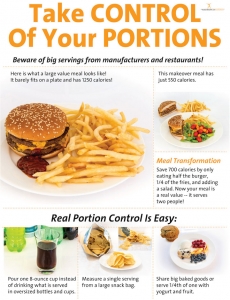
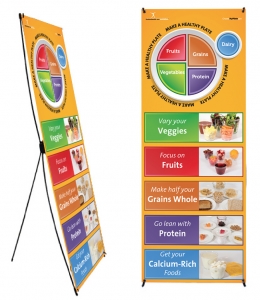
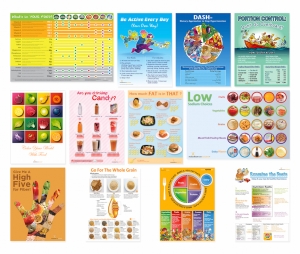 Thanks for sticking around to the bitter end! Here's a handout for your trouble -- get your copy today!
Thanks for sticking around to the bitter end! Here's a handout for your trouble -- get your copy today!